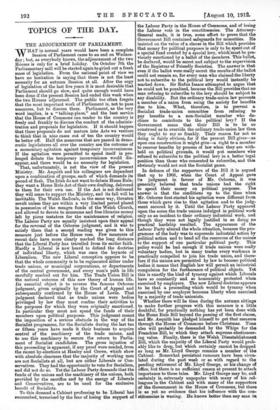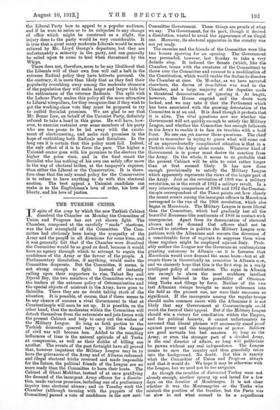TOPICS OF THE DAY.
THE ADJOURNMENT OF PARLIAMENT. -wHAT in normal years would have been a complete Session of Parliament came to an end on Wednes- day; but, as everybody knows, the adjournment of the two Houses is only for a brief holiday. On October 7th the Parliamentary mill will be started again to grind out a fresh mass of legislation. From the national point of view we have no hesitation in saying that there is not the least necessity for an autumn Session at all. After the orgy of legislation of the last five years it is most desirable that Parliament should go slow, and quite enough would have been done if the present Session had ended this week when the two Houses adjourned. The public too often forgets that the most important work of Parliament is, not to pass measures, but to discuss them. Parliament, as the very word implies, is a " talking-place," and the best service that the House of Commons can render to the country is freely and frankly to discuss the conduct of the adminis- tration and proposals for legislation. If it should happen that these proposals do not mature into Acts we venture to think that in nine cases out of ten the country would be better off. Half the measures that are passed in demo- cratic legislatures all over the country are the outcome of a momentary agitation against temporary inconveniences. If the agitation were permitted to spend itself in pro- longed debate the temporary inconvenience would dis- appear, and there would be no necessity for legislation.
That, unfortunately, is not the view of the present Ministry. Mr. Asquith and his colleagues are dependent upon a combination of groups, each of which demands its pound of flesh. The Irish do not want to debate Home Rule; they want a Home Rule Act of their own drafting, delivered to them for their own use. If the Act is not delivered they will cease to support the Ministry, and its fall will be inevitable. The Welsh Radicals, in the same way, threaten revolt unless they are within a very limited period placed in possession of the meagre funds of the Welsh Church, and allowed to devote to museums and free libraries money left by pious testators for the maintenance of religion. The Labour Party are equally' insistent upon their appeal for the reversal of the Osborne judgment, and it was to satisfy them that a second reading was given to this measure just before the House rose. Few measures of recent date have more clearly marked the long distance that the Liberal Party has travelled from its earlier faith. Hardly a Liberal is now beard to defend the doctrine of individual liberty, which was once the keynote of Liberalism. The new Liberal conception appears to be that the whole community is to be regimented either under trade unions, or municipal corporations, or departments of the central government, and every man's path in life carefully marked out for bim. The Trade Union Bill is the natural outcome of this new theory of human life. Its essential object is to reverse the famous Osborne judgment, given originally by the Court of Appeal and subsequently confirmed by the House of Lords. That judgment declared that as trade unions were bodies privileged by law they must confine their activities to the purposes for which they were originally sanctioned. In particular they must not spend the funds of their members upon political purposes. This judgment meant the imposition of a serious obstacle in the way of the Socialist programme, for the Socialists during the last ten or fifteen years have made it their business to acquire control of the machinery of the trade unions, and to use this machinery to secure the return to Parlia- ment of Socialist candidates. The gross injustice of this proceeding is apparent, if any proof were needed, from the recent by-elections at Hanley and Crewe, which show with absolute clearness that the majority of working men are not Socialists at all, but are either Liberals or Con- servatives. They had the opportunity to vote for Socialism, and did not do so. Yet the Labour Party demands that the funds of the unions and the machinery of the unions, both provided by the sacrifice and by the energy of Liberals and Conservatives, are to be used for the exclusive benefit of Socialists.
To this demand a Cabinet professing to be Liberal has succumbed, terrorized by the fear of losing the support of the Labour Party in the House of Commons, and of losing the Labour vote in the constituencies. The Attorney- General made, it is true, some effort to prove that the Government Bill contained safeguards for minorities. He insisted on the value of a clause in the Bill which provides that money for political purposes is only to be spent out of a special fund created by a special levy, which:must be pre- viously sanctioned by a ballot of the members. This ballot, he declared, would be secret and subject to the supervision of the Registrar of Friendly Societies. The answer is that even if the ballot were really secret the results of the ballot could not remain so, for every man who claimed the liberty not to subscribe to the political levy would instantly be marked down. Sir Rufus Isaacs attempted to argue that he could not be penalized, because the Bill provides that no man refusing to subscribe to the levy should be subject to any disability. But the ordinary trade-union law prevents a member of a union from suing the society for benefits due to him. What, therefore, is to prevent a Socialist trade-union committee from refusing to pay benefits to a non-Socialist member who de- clines to contribute to the political levy ? If the Government mean that their Bill is to be so construed as to override the ordinary trade-union law then they ought to say so frankly. Their reason for not so doing is fairly obvious, for if the present Bill gives—as upon one construction it might give—a right to a member to recover benefits by process of law when they are with- held on political grounds, it would put members who refused to subscribe to the political levy in a better legal position than those who consented to subscribe, and this obviously would not suit the Socialist game.
In defence of the supporters of the Bill it is argued that up to 1908, when the Court of Appeal gave its judgment in favour of Mr. Osborne, it was generally believed that trade unions had the right to spend their money on political purposes. The answer is that the conditions up to the time when Mr. Osborne first started his agitation were different from those which gave rise to that agitation and to the judg- ment secured by it. Until the Labour Party appeared upon the scene the trade unions indulged in political work only as an incident to their ordinary industrial work, and though they were not legally justified in so doing no practical hardship resulted. The appearance of the Labour Party altered the whole situation, because the pro- gramme of the body was to supersede industrial action by political action and to bend all the resources of the unions to the support of one particular political party. This policy would be bad enough if trade unions were really voluntary bodies, but in many trades every workman is practically compelled to join his trade union, and there- fore if the unions are permitted by law to become political bodies it means that English law will permit an industrial compulsion for the furtherance of political objects. Yet this is exactly the kind of tyranny against which Liberals have so constantly and so honourably protested when exercised by employers. The new Liberal doctrine appears to be that a proceeding which would be tyranny when exercised by one employer becomes liberty when exercised by a majority of trade unionists. Whether there will be time during the autumn sittings to make further progress with this measure is a little doubtful, for practically nothing has yet been done with the Home Rule Bill beyond the passing of the first clause, and Mr. Asquith has pledged himself to get that measure through the House of Commons before Christmas. Time also will probably be demanded by the Whips for the Franchise Bill, to which they attach supreme electioneer- ing value. Finally, there is the Welsh Disestablishment Bill, which the majority of the Liberal Party would prob- ably like to drop, but which certainly cannot be dropped. as long as Mr. Lloyd George remains a member of the Cabinet. Somewhat persistent rumours have been circu- lated during the past week or so with regard to the pending retirement of Mr. Lloyd George, or his change of office, but there is no sufficient reason at present to attach importance to these tales. Mr. Lloyd George may be, and certainly is, extremely unpopular with many of his col- leagues in the Cabinet and with many of the supporters of the Government in the House of Commons, but there is as vet no evidence that his influence with the con- stituencies is waning. He knows better than any man in the Liberal Party how to appeal to a popular audience, and if he were to retire or to be subjected to any change of office which might be construed as a slight, the injury done to the party would be very considerable. It is true that a great many moderate Liberals would be much relieved by Mr. Lloyd George's departure, but they are unfortunately a minority in the party, and can generally be relied upon to coins to heel when threatened by the Whips. There does not, therefore, seem to be any likelihood that the Liberals will of their own free will call a halt in the extreme Radical policy they have hitherto pursued. On the contrary, it is more than likely that as they find their popularity crumbling away among the moderate elements of the population they will make larger and larger bids for the enthusiasm of the extreme Radicals. The split with the Labour Party makes this policy all the more attractive to Liberal wirepullers, for they recognize that if they wish to get the working-class vote they must be prepared to try to outbid Socialist promises. We are glad to see that Mr. Bonar Law, on behalf of the Unionist Party, definitely refused to take a hand in this game. He will have, how- ever, to exercise restraint over some members of his party who are too prone to be led away with the excite- ment of electioneering, and make rash promises in the hope of outbidding both Radicals and Socialists. In the long run it is certain that this policy must fail. Indeed, the only effect of it is to force the pace. The higher a Unionist orator goes with his promises to the electors the higher the price rises, and in the final resort the Socialist who has nothing of his own can safely offer more in the way of electoral bribes, at the taxpayer's expense, than either the Liberal or the Conservative. It is there- fore clear that the only sound policy for the Conservative is to refuse to have anything to do with this electoral auction. The best appeal a Unionist candidate can make is to the Englishman's love of order, his love of liberty, and his love of justice.



































 Previous page
Previous page